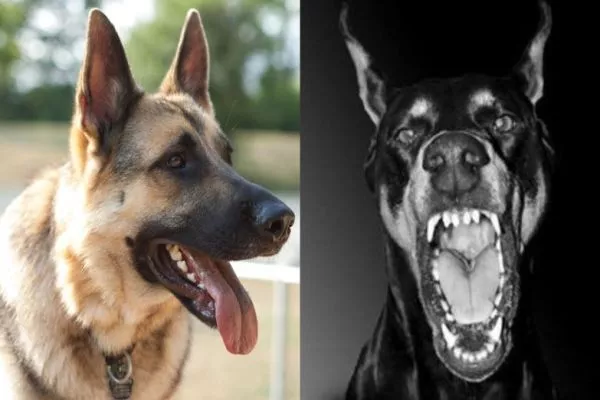Contents
- 1 Doberman vs German Shepherd: History and Origin
- 2 Doberman vs German Shepherd: Appearance
- 3 Doberman vs German Shepherd: Lifespan and Size
- 4 Doberman vs German Shepherd: Temperament
- 5 Doberman vs German Shepherd: Trainability
- 6 Doberman vs German Shepherd: Adaptability
- 7 Doberman vs German Shepherd: Dietary Nutrition
- 8 Doberman vs German Shepherd: Exercise Needs
- 9 Doberman vs German Shepherd: Health issues
- 10 Doberman vs German Shepherd: Bite force
- 11 Doberman vs German Shepherd: Price
- 12 FAQ
- 13 Final Thoughts
If you’re considering getting a new furry friend, it’s important to do your research and choose the right breed for your lifestyle. Two popular breeds that often come up in discussions are Dobermans and German Shepherds.
In this article, we will compare these two breeds across various aspects such as temperament and health issues to help you make an informed decision on which one is better suited for you.
Doberman vs German Shepherd: History and Origin
The Doberman breed was created in Germany by a man named Karl Friedrich Louis Dobermann in the late 1800s. Dobermann worked as a tax collector and needed a dog to protect him during his rounds.
So, he set out to breed a new kind of dog with the perfect traits for the job. He mixed different breeds like Rottweilers, German Pinschers, and Greyhounds to create what we now know as the Doberman.
On the other hand, German Shepherds were also originally bred in Germany by a man named Max von Stephanitz in 1899.
Stephanitz wanted to develop a versatile working dog that could herd sheep, guard property, and assist the police.
The German Shepherd’s intelligence, ability to be trained, bravery, and loyalty made it an excellent choice for these tasks.
They gained popularity worldwide after World War I when soldiers returning home brought them with them.
Both breeds have similar qualities, such as their protective instincts and high levels of intelligence, which make them suitable for various roles, including being service dogs or family pets.
However, their different origins meant that they were initially bred for slightly different purposes, which can still influence their temperament or physical characteristics today.
By understanding their histories, we can develop a deeper appreciation for these incredible breeds.
Also, Read- Pekingese Dog Price in India
Doberman vs German Shepherd: Appearance

When it comes to appearance, these two breeds have more differences than just their colors and sizes. Dobermans are recognized for their sleek and muscular bodies. They have short coats that can be black, red, blue, or fawn in colour. Their heads have a wedge shape, their ears are cropped, and their tails are docked.
On the other hand, German Shepherds have longer coats that can be black and tan, sable, all-black, or even pure white. They have a more elongated body shape and naturally upright, pointed ears.
In the end, whether you prefer the majestic elegance of the German Shepherd or the athletic grace of the Doberman will depend on your personal preferences for the physical appearance of a canine companion.
Doberman vs German Shepherd: Lifespan and Size
The lifespan and size of these two breeds can vary, with German Shepherds having a slightly longer life expectancy of 10-13 or 14 years compared to the Doberman’s average lifespan of 10-12 years.
When it comes to size, Dobermans are generally larger than Dobermans. The average height for a male German Shepherd is around 24-26 inches, while Dobermans stand at about 26-28 inches tall.
In terms of weight, German Shepherds weigh between 50-90 pounds, while Dobermans are usually between 60-100 pounds.
While the difference in lifespan may seem minor, it can have an impact on how long you get to enjoy your furry companion. It’s important to note that both breeds can be prone to certain health issues that can affect their longevity.
Also, Read- Alaskan Malamute Price in India
Doberman vs German Shepherd: Temperament

Both Dobermans and German Shepherds are smart and devoted dogs that make wonderful companions. However, they have some distinct personality traits that make them different from each other.
Dobermans are known for being fearless and are often employed as guard dogs or police dogs.
They can be very protective of their owners and might show aggression towards strangers if they haven’t been properly socialized.
On the other hand, German Shepherds are also protective of their owners but tend to be more reserved with people they don’t know. They have a natural instinct to protect and assist, which is why they are commonly used as service animals.
Even though they have different temperaments, both breeds require proper training and socialization from a young age to ensure they grow up to be well-behaved adult dogs.
Dobermans need firm yet gentle handling, while German Shepherds respond well to positive reinforcement training methods.
Understanding the temperament differences between Dobermans and German Shepherds is important when deciding which breed is the right fit for you.
Whether you prefer a fearless guardian or a loyal service animal, both breeds have unique qualities that can make them exceptional companions for the right owner.
Doberman vs German Shepherd: Trainability
Training your furry friend is essential to ensure they develop into a well-behaved dog, and it’s crucial to understand their trainability differences.
German Shepherds are known for being highly trainable due to their intelligence and eagerness to please their owners. They excel in obedience training and can quickly learn new commands with consistency and positive reinforcement.
On the other hand, Dobermans are also renowned for their trainability, but they require a more firm approach during training. They have a strong will, which means that they need an owner who can provide clear boundaries and guidelines consistently.
However, once trained correctly, they become incredibly loyal companions who will do anything to protect their families. When comparing the two breeds’ trainability, it ultimately comes down to personal preference and experience as an owner.
Also, Read- Most Protective Dog Breeds in the World
Doberman vs German Shepherd: Adaptability

You might be wondering how these two breeds adapt to different living situations and environments. Both Dobermans and German Shepherds can adapt well to different environments.
German shepherds are more adaptable in terms of climate, living arrangements, and lifestyle. They can tolerate both hot and cold climates.
They also tend to adjust better to different living arrangements such as apartments or homes with small yards due to their smaller size.
Additionally, they are known for being able to handle a variety of lifestyles from active families who love outdoor activities to individuals who prefer a more laid-back lifestyle.
On the other hand, Dobermans may be slightly less adaptable when it comes to climate since they have a short hair coat without any undercoat which makes them less tolerable to certain temperatures especially when it is cold.
With proper training, Dobermans can also adapt well to the apartment lifestyle as long as their mental and physical needs are met.
Doberman vs German Shepherd: Dietary Nutrition
Both Dobermans and German Shepherds require a balanced diet that includes protein, carbohydrates, fats, vitamins, and minerals.
Dobermans are known for having sensitive stomachs and may be prone to digestive issues such as bloating or diarrhoea if fed the wrong foods.
It’s recommended that they’re fed high-quality dog food that contains easily digestible proteins such as chicken or fish. Additionally, Dobermans may benefit from supplements like glucosamine and chondroitin to support joint health.
On the other hand, German Shepherds have a higher tendency towards obesity due to their love for food and lack of exercise.
Therefore, it’s important to regulate their caloric intake and ensure they get enough exercise throughout the day. A balanced diet of lean proteins like chicken or turkey with healthy grains like brown rice or quinoa can help keep them healthy and active.
In conclusion, both Doberman Pinschers and German Shepherds need proper nutrition in order to maintain good health throughout their lives.
By providing them with high-quality dog food tailored to their specific needs, along with supplements when necessary, you can help ensure they live happy and healthy lives by your side!
Doberman vs German Shepherd: Exercise Needs

Both Dobermans and German Shepherds are high-energy breeds that require plenty of exercise. there is not any significant difference in their exercise needs.
On average, both breeds need 1.5-2 hrs of daily exercise. However, German shepherds are slightly more energetic.
Exercises can include brisk walks or runs, obedience training sessions, games of fetch or frisbee, or even specialized activities like dock diving or agility courses.
Doberman vs German Shepherd: Health issues
Both Dobermans and German Shepherds are prone to certain health conditions that can affect their quality of life.
For instance, Dobermans are known to suffer from heart problems such as dilated cardiomyopathy, which can lead to heart failure. They are also susceptible to von Willebrand’s disease, a bleeding disorder that affects blood clotting.
On the other hand, German Shepherds are prone to hip dysplasia, a condition where the hip joint doesn’t develop properly and can cause pain and mobility issues.
They also have a higher risk of developing degenerative myelopathy, a progressive neurological disorder that affects their spinal cord and can lead to paralysis.
Additionally, both breeds may be predisposed to certain types of cancer such as osteosarcoma.
It’s important for pet owners to be aware of these potential health issues so they can take preventative measures or seek treatment early on if necessary.
Regular check-ups with a veterinarian and maintaining a healthy diet and exercise routine can help reduce the risk of some conditions.
By being proactive in your pet’s healthcare, you can ensure they live happy and healthy lives by your side for years to come.
Doberman vs German Shepherd: Bite force

If you’re curious about which breed has a stronger bite, you’ll be interested to know that the saying ‘It’s not the size of the dog in the fight, it’s the size of the fight in the dog’ holds true when it comes to comparing Dobermans and German Shepherds.
Both breeds have a powerful bite force, with Dobermans having an average bite force of 245 psi (pounds per square inch) and German Shepherds having an average bite force of 238 psi.
However, it’s important to note that individual dogs can have varying levels of strength in their jaws.
The strength of a dog’s bite is influenced by several factors including genetics, exercise, diet and training.
Although both Dobermans and German Shepherds are known for their strong jaw muscles and sharp teeth, they are not naturally aggressive or dangerous.
In fact, aggression is often a result of poor breeding or poor handling by owners. It’s important for owners to socialize their dogs from an early age and teach them appropriate behaviour to prevent any unwanted biting incidents.
In summary, both Doberman Pinschers and German Shepherds have impressive jaw strength which makes them excellent guard dogs or police K9s.
However, it’s important to remember that proper training and socialization play a crucial role in preventing any aggressive behaviour towards humans or other animals
Doberman vs German Shepherd: Price
While both Dobermans and German Shepherds are known for their intelligence, loyalty, and protective nature, they come with different price tags.
In India, a purebred Doberman pup can cost you anywhere from Rs. 10,000 to Rs. 30,000 depending on the breeder’s reputation and location. On the other hand, a German Shepherd pup can cost you around Rs. 10,000 to Rs. 50,000.
When it comes to buying a dog in India, price is not the only factor that matters. You also need to consider factors like temperament, health issues (if any), training requirements, and living conditions before making your decision.
Also, Read- Cocker spaniel Price in India
FAQ
1. Are Dobermans more aggressive than German Shepherds?
Aggression levels in dogs can vary based on individual temperament, socialization, and training.
While both Dobermans and German Shepherds have the potential for aggression, responsible ownership, early socialization, and positive training methods can help mitigate aggressive behaviour.
2. Can Dobermans and German Shepherds get along with children?
With proper socialization and training, both Dobermans and German Shepherds can form strong bonds with children and be affectionate family pets.
However, supervision and teaching children how to interact respectfully with dogs are essential for a harmonious relationship.
3. Which breed is better for guarding purposes?
Dobermans and German Shepherds are highly capable guard dogs. Dobermans are specifically bred for guarding and protection, while German Shepherds also excel in this role.
The choice ultimately depends on personal preference and specific requirements.
4. Do Dobermans require more grooming compared to German Shepherds?
Dobermans have short, smooth coat that requires relatively low maintenance in terms of grooming. German Shepherds, with their dense double coats, require more frequent brushing and occasional bathing to keep their coats healthy and minimize shedding.
5. Are Dobermans and German Shepherds suitable for first-time dog owners?
Both Dobermans and German Shepherds can be good choices for people who are getting a dog for the first time, as long as they do their homework, are dedicated to training, and socialize the dog well.
It’s a good idea for first-time owners to seek advice from experienced dog trainers or breeders to ensure they start off on the right foot.
Final Thoughts
Congratulations! You’ve reached the end of this article comparing Dobermans and German Shepherds. After reading through all the points, you might have already made up your mind about which breed you prefer.
However, before you make a final decision, let’s take a moment to appreciate the irony. Despite being two of the most popular breeds in India, both Dobermans and German Shepherds share similar health issues and exercise needs. The only significant difference is their appearance and temperament.
So, unless you’re looking for a specific look or personality trait, it seems like choosing between these two breeds is merely a matter of personal preference.
In conclusion, while this comparison may seem informative at first glance, it ultimately leaves us with an ironic realization that these two breeds are more alike than different. But hey – at least now you have enough information to choose your new furry friend wisely!
Hope you found it helpful
Thank you for Reading.
